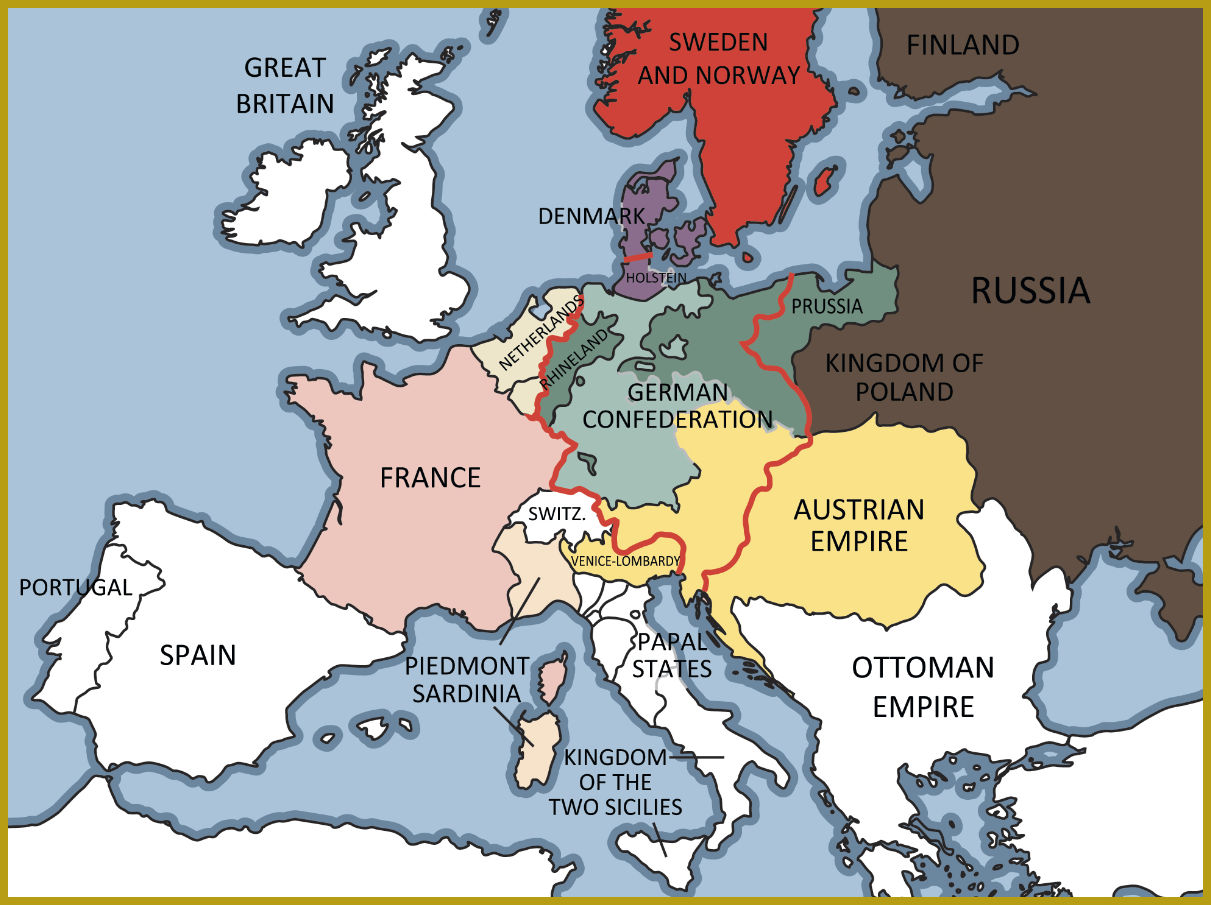After the fall of the Napoleonic Empire, a new international system emerged to maintain the balance of power in continental Europe. The United Kingdom was interested to prevent the creation of a new continental empire able to threat its economic expansion. Austria, under the direction of prince Klemens von Metternich, was eager to preserve its preeminence in Central Europe and to expand over the Balkans, but the heterogeneity of the peoples and nationalities under its control led to a anti-nationalist, anti-liberal position, and made it necessary to support the statu quo. Russia, under Tsar Alexander I, was an autocratic country, ready to expand towards the Black Sea, the Pacific Ocean and Central Europe. Prussia was waiting to consolidate a hegemonic position in Germany at the expense of Austria. Finally, France (in spite of being a defeated nation) has seen recognized its right to participate in the new international system, thanks to the ability of its minister Talleyrand.
The Congress of nations takes place in Vienna in 1814; what is important to underline is the willingness of the different countries to meet in order to reach an agreement in different matters, such as the new borders of Europe. Russia keeps Finland from Sweden, Bessarabia from Turkey, and most of Poland. Prussia obtains several territories in Germany, above all the Rhineland. Austria losses Flanders, but in exchange receives Venice and Lombardy in Italy, and Austrian princes will rule Parma, Modena and Tuscany. As barriers against France two little States enlarge their territories: in the South the kingdom of Sardinia, and in the North the Low Countries receive Belgium. In sum, the greatest advantage goes for Great Britain, since the new Europe guarantees the balance of powers and the British economic expansion based on its naval superiority and industrial growth. Moreover, Great Britain receives Malta and the Ionic islands in the Mediterranean, and other possessions that ensured its maritime hegemony.
The coming back to power of Napoleon (The Hundred days) meant the interruption of negotiations and the creation of the Quadruple Alliance. The Quadruple Alliance between Russia, Prussia, Austria and Great Britain was created to preserve the balance of power in Europe, and to prevent any new attempt by France to restore a hegemonic position in the Continent.
Nevertheless, the other main international commitment, the Holy Alliance, was not signed by Great Britain. It was suggested by Tsar Alexander on a religious basis: the compromise by the Orthodox, Catholic and Protestant sovereigns (Russia, Austria and Prussia) to fight against revolutionary movements, to preserve the status quo and to consult each other in different meetings -the Concert of Europe, based on a system of Congresses. Actually it implied the right to intervene in the domestic affairs of any country to keep absolute monarchs in their thrones. The principles of the rule of the legitimate dynasties (legitimism), and the right to restore legitimate princes (intervention), are the two main features of the European Concert.
Great Britain, enjoying a Parliamentarian regime, refuses to give its systematic support to this conservative scheme. Although the British participate in the Congress of Aix-la-Chapelle in 1818, they do not attend subsequent congresses (Troppau 1820, Laibach 1821). Great Britain does not approve the intervention in Spain discussed in the fourth Congress that takes place in Verona in 1823.
Nevertheless, although the countries at war against revolutionary France try to keep their borders closed against the influence of the new ideas, it was not possible to stop the political, social and economic changes initiated by the French revolution. National movements against the Napoleonic invasion had already changed social and political perspectives.

